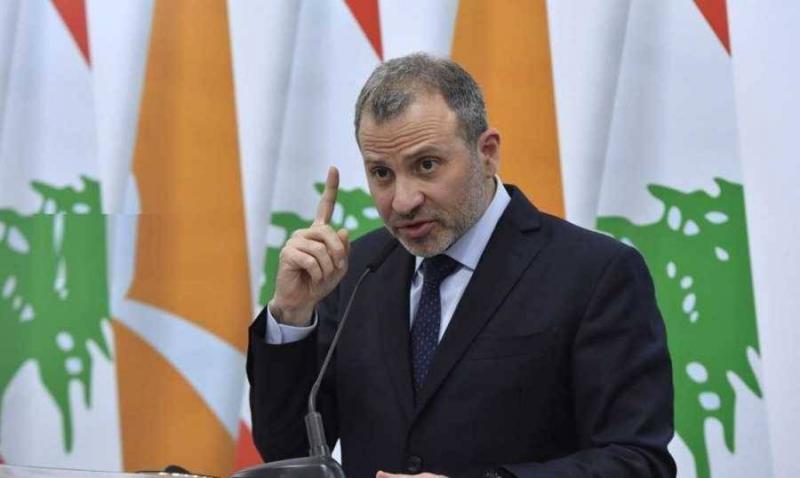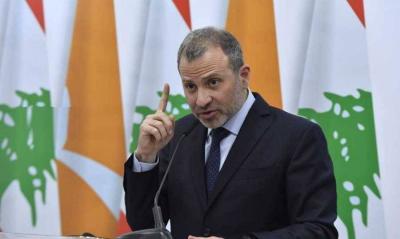The leader of the Free Patriotic Movement, Deputy Jibran Bassil, continues to affirm his distinction from both allies and opponents, drawing a clear line between domestic needs for national consensus and external issues that can only be approached through the unity and integration of constitutional institutions, as stated in "Al-Anbaa" newspaper. Regarding the stabilization of land borders and the mission of the U.S. presidential envoy Amos Hochstein, Bassil links any agreement on demarcation to the existence of a President, asserting that "the approval of an agreement or any action contributing to demarcation requires the presence of a President."
Concerning Lebanon's protection, Bassil believes that "the state and national unity, which involves partnership and a defensive strategy concomitant with national sovereignty, are all factors that protect Lebanon. There are three essential matters for building Lebanon's future: firstly, neutralizing it from conflicts without disengaging from its commitments to regional issues and from the issues which have Arab consensus, such as the Palestinian cause or the conflict with Israel. In this regard, he aligns closely with the Maronite Patriarch Bechara Boutros Al-Rahi's stance. Secondly, there is a need to develop the system with an emphasis on administrative decentralization, which means implementing one of the key reform provisions in the Taif Agreement that has not yet been realized. Finally, creating an economic and financial model based on production and financing investment, centered around a credit fund, which Bassil means is about fair distribution of wealth and its returns."
Regarding the presidential election, Bassil insists on his proposal for a "solution through electing a consensus president because the names currently proposed do not have a chance to succeed." He reiterates his opposition to electing Army Commander Joseph Aoun or head of the Marada Movement Sleiman Franjieh, while maintaining the importance of partnership in governance and public affairs. He emphasizes that it is unacceptable for Christians to be excluded from power, governance, the state, or the homeland, stating that there cannot be authority without the Christian component, otherwise things would not be in order.
What about the relationship with Hezbollah? Bassil maintains that "the paper of understanding cannot sponsor the relationship between us and Hezbollah. We have failed to convey to the people that this understanding built a state for them; I stated this in 2012, not today. We had hoped to witness a reformist role alongside the resistant role." This implies his repeated accusation that Hezbollah has not engaged in the reform process, indicating that the nature of the relationship with Hezbollah is based on specific issues.
Bassil differentiates, according to "Al-Anbaa," between "his agreement with Hezbollah to protect Lebanon against Israel and the responsibility of the party for using the force it possesses to claim Lebanon's rights in its struggle with Israel. The document of understanding addressed defending Lebanon but did not discuss liberating Palestine, which remains the duty of Palestinians on their land, not ours. In the Lebanese-Lebanese dialogue, we agreed to disarm the Palestinians and concluded the armed Palestinian struggle. As long as Palestinians can fight on their land, their mission becomes to combat on their land and determine how they want to establish their state."
For the first time, Bassil expresses his "reality" of affection for the Speaker of Parliament Nabih Berri, stating, "Personally, I like President Berri a lot, but there are matters based on experiences that need us to cooperate more to save the country, such as the presidency and civil state." By doing so, he sends Berri a clear message of readiness to form an alliance based on a political-reform project.
Bassil maintains hope for the restoration of order in the Sunni political arena in Lebanon, saying, "I hope that the Future Movement will return from its abstention, and no one from the Sunni community should feel sidelined or marginalized, nor can we do anything without them." He expresses nostalgia for the brief period of harmony during his collaboration with former Prime Minister Saad Hariri, which did not last long.
Bassil does not hide his advanced proposal regarding peace in the region, which contradicts the orientation of his ally Hezbollah. He affirms that "he is in favor of the logic of peace, as this region, in which we live, has given rise to the heavenly religions. Hence, we support the idea of coexistence, and the land of Palestine embodies this notion. Jerusalem should be an open city for all religions; here, Israel errs by closing it off. There are political leaders who have worked for peace, and 'October 7' should give birth to a new Israeli political, popular, and leadership movement that demands this direction," suggesting a reference to former Prime Minister Yitzhak Rabin, who was assassinated by radical Israelis for his inclination toward a comprehensive peace project in the region and for the principle of land for peace.




